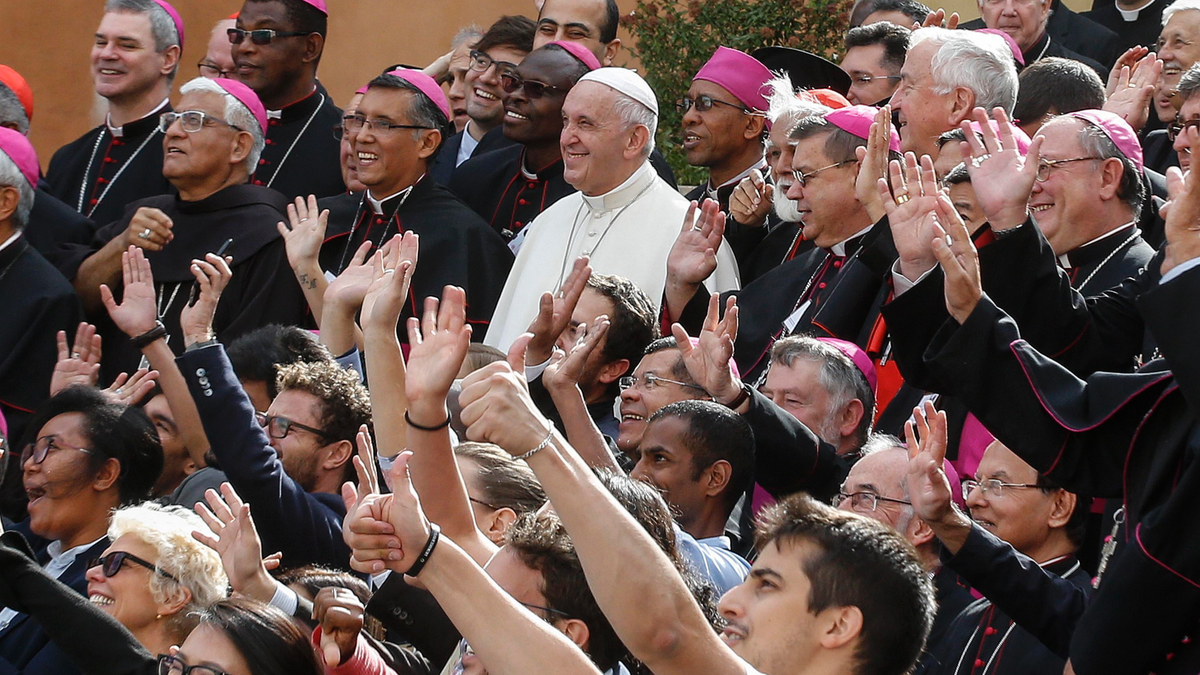
Pope Francis poses for a group photo with bishops and partecipants during the last day of the synod of bishops, at the Vatican, Saturday, Oct. 27, 2018. (Fabio Frustaci/ANSA via AP)
VATICAN CITY – A monthlong meeting of Catholic bishops marked by demands for women's rights wrapped up Saturday with delegates saying a place for women at the church's decision-making table was a "duty of justice" and that the church as a whole must recognize the urgency of "inescapable change."
Pope Francis had called the summit of church leaders to debate ways to better minister to young people and help them find their vocations in life. But the synod was quickly taken over by debate about issues that are particularly dear to the young in many parts of the world: the clergy sex abuse scandal, respect for gays, and women's rights.
The issue of women was particularly acute given only seven nuns were invited to participate in the synod alongside 267 cardinals, bishops and priests. None of the women had the right to vote on the final document.
A petition launched on the sidelines of the synod demanding women religious superiors be allowed to vote garnered some 9,000 signatures, but reference in a draft to the gender disparity at future synods was scrapped in the final document.
The language that was kept, however, was strong and included one of the few straight-forward recommendations in the entire 60-page document.
"The synod recommends that everyone be made aware of the urgency of an inescapable change," it said. It called for greater presence of women in church structures at all levels, including positions of responsibility, while respecting that the priesthood remains for men only.
"It's a duty of justice, that finds its inspiration in the way Jesus related to the men and women of his time, as well as the importance of the role of some female figures in the Bible, in the history of salvation and in the life of the church," the document read.
Church doctrine reserves the priesthood for men, given Christ's apostles were male. Women have often complained they have a second-class status in the church. History's first Latin American pope has vowed to change that, but he has done little and counts no women among his own advisers.
Paragraphs referencing the role of women in the church were among the most contested during the final vote Saturday. But the full text passed with only the paragraph referencing homosexuality and "sexual inclinations" receiving enough no votes as to threaten passage. In the end it passed with 178 yes votes and 65 no votes, approved with 12 yays to spare.
The final text made no reference to "LGBT" faithful, which had been used in the preparatory document in what was a first for a Vatican text. While the term was rejected for the final document, the delegates voted to not scrap that initial text but to consider it "complementary," suggesting that the LGBT term lives on in an official way.
On abuse, the bishops stopped short of issuing a straight-forward communal apology for the decades of sex abuse and cover-up committed by priests and their superiors against young people. While that section of the document was entitled "Seek Pardon," the text voted on by bishops said merely that no amount of repentance can heal the trauma caused to victims. Thirty bishops voted against it.
Delegates have said that many bishops, particularly from Africa, rejected the emphasis placed on the abuse issue during the meeting, which unfolded as the Catholic hierarchy at the Vatican, in the U.S., Chile and elsewhere, is once again under fire for its botched handling of the scandal.
The bishops thanked victims for their courage in denouncing their abuse and said confronting the problem with necessary sanctions and actions "could truly be an opportunity for epochal reform."
But Francis had very different message when he addressed the synod after the text was approved. He complained that the church was being "persecuted" and "dirtied" by accusations from the devil — an apparent reference to claims by a former Vatican ambassador that Francis himself covered up for a sexual predator.
Francis removed the former archbishop of Washington, Theodore McCarrick, as a cardinal in July after a U.S. church investigation determined an accusation he molested a teen-age altar boy was credible. But Archbishop Carlo Maria Vigano has claimed that Francis had previously rehabilitated McCarrick from restrictions placed on him by the previous pope.
Francis said now was thee time to come to the defense of the church, which he referred to as "mother."
"It's a difficult moment because the accuser, through us, is attacking the mother," he said. "And you don't touch the mother."
___
Winfield reported from New York.








































